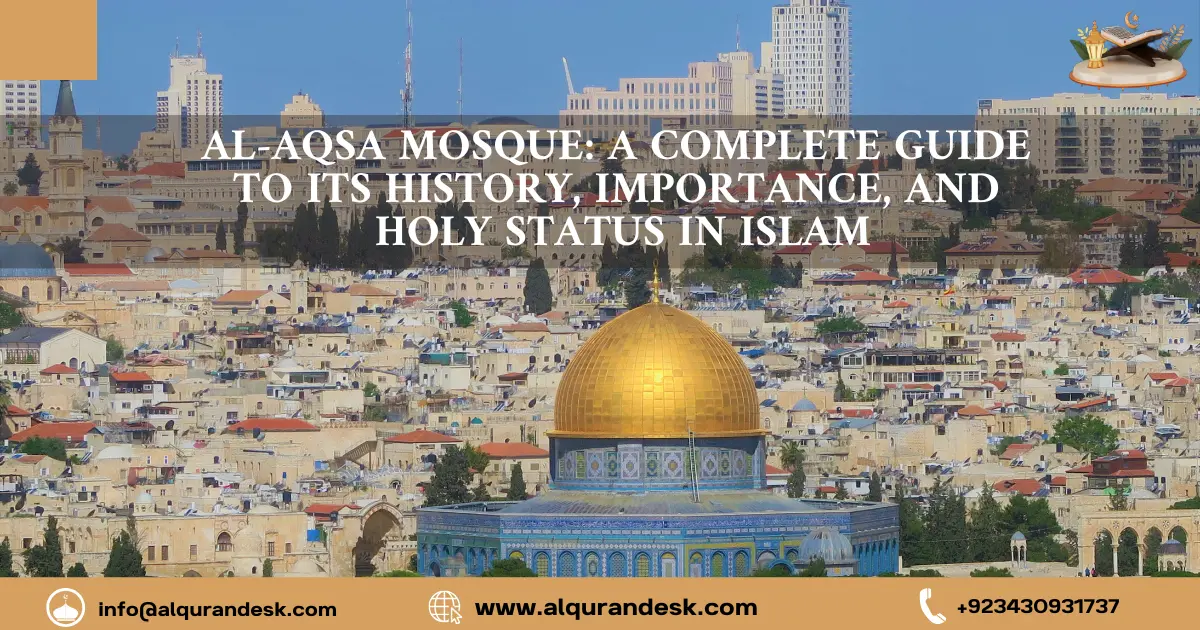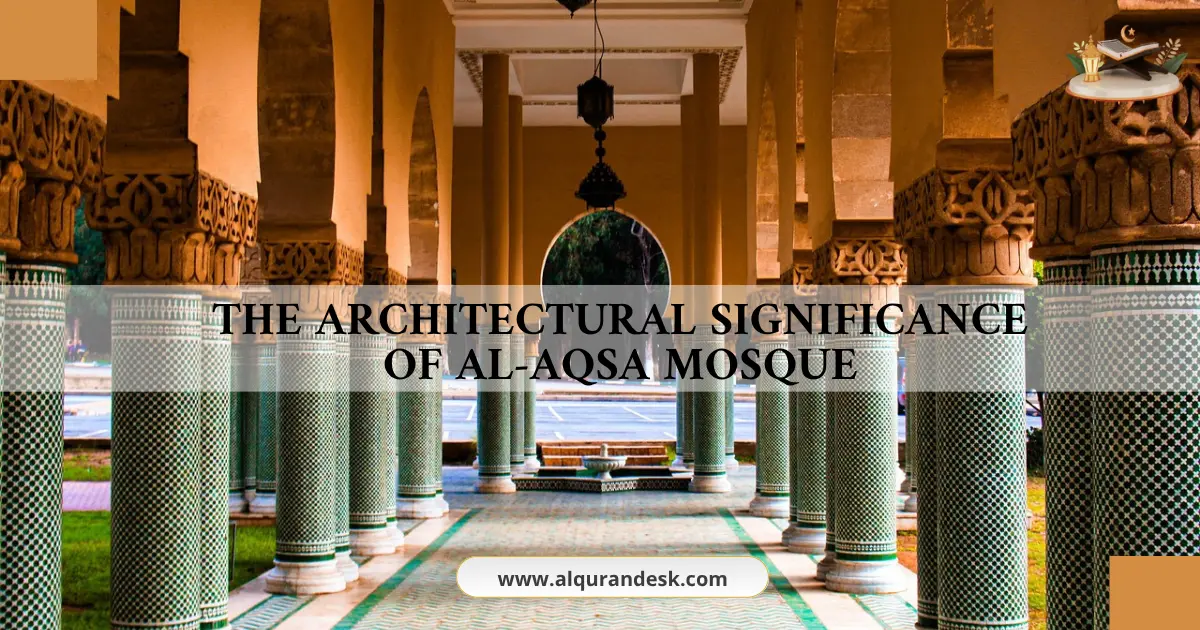
7 Essential Facts About Al-Aqsa Mosque: A Complete Guide to Its History in Islam
Introduction
Al-Aqsa Mosque is one of the sacred and important places of the Islamic religion. It sits in the holy city of Jerusalem, the most important site of Muslims in the world, next to Mecca and Medina. Al-Aqsa represents the profound spiritual significance of the building in terms of its historical content and legacy, which has been echoed throughout Islamic civilisation and religion. Throughout this guide, we will take a look at the history of Al-Aqsa Mosque, its spiritual and religious importance, architectural peculiarities, and why it should become of utmost importance to the preservation of this holy place to come after us.
Online study materials at AlQuranDesk provide knowledge and spiritual sustenance to the Muslim community worldwide, interested in learning more about Islamic history and the practice of their religion.
History of Al-Aqsa Mosque
The history of Al-Aqsa mosque goes back to the ancient times of Islam. It is given its importance during the miraculous Night Journey (Isra’ wal Mi Raj) of the Prophet Muhammad ﷺ when he travelled between Mecca and Jerusalem and was taken to the heavens beginning in the holy precincts of the Al-Aqsa. The Islamic scholars are confident that this incident gave Jerusalem the official position of a sacred city in the Islamic faith. Al-Aqsa Mosque was first built by the Umayyad Caliph Abd al-Malik ibn Marwan and his son Al-Walid I in the late 7th century CE. The site has been restored and expanded with various Islamic dynasties in turn, such as Abbasids, Fatimids, Ayyubids, Mamluks and Ottomans.
1. Al-Aqsa Mosque and Jerusalem
Al-Quds, or Jerusalem, is of huge importance to Abrahamic religions. In Islam, this was the original Qiblah (direction of prayer) before Allah necessitated a change to the Kaaba at Mecca. Historical and religious heritage reaches across centuries, uniting the fate of the prophets, caliphs, scholars and Muslim rulers.
A mosaic of nearly 144,000 square meters in area, the Al-Aqsa Mosque complex belongs to the Haram al-Sharif (Noble Sanctuary), which occupies more than 230,000 square meters. This holy land has seen Islamic proselytism, political uprising and cultural development that has defined Muslim identity as well as the area politics of the region.
2. Historically Important Events and Personalities
There are some significant figures in the history attached to the story of the mosque:
In 1187 CE, Salahuddin Ayyubi (Saladin) reconquered Jerusalem, and Al-Aqsa got its purity back once again in front of Crusader forces. The mosque suffered major renovations under Ottoman rule that maintained the structural stability and attractiveness of the mosque.
Symbolically, the mosque continues to play a strong identity of Palestinians and the Islamic solidarity under current political pressures in the contemporary world.
3. Architectural relevance of Al-Aqsa Mosque
Speciality and Design
Al-Aqsa Mosque is the masterpiece of Islamic architecture. The mosque, however, has a beautiful silver-grey dome, unlike the golden Dome of the Rock that most people wrongly relate to Al-Aqsa. The prayer hall of the mosque has a large architecture erected on well-cultivated decorative arches and marble columns. Highlights of its interior include the mihrab (prayer niche) and the highly decorated minbar (pulpit), which were initially ordered by Salahuddin Ayyubi and show several hundred years of Islamic art and piety.

4. Symbolic Meanings
In addition to the beauty created, Al-Aqsa has spiritual implications in every structure:
- It is facing Mecca to show the unity of Muslims.
- The divine connection and purification are replicated in the sacred precincts.
- Its minarets and calligraphy preach religion and education.
5. Al-Aqsa Mosque and Its Religious Value
Position in Islamic Theology
Al-Aqsa Mosque assumes great religious significance in Islamic theology. In surah Al-Isra (17:1) of the Quran, it is mentioned:
سُبۡحٰنَ الَّذِىۡۤ اَسۡرٰى بِعَبۡدِهٖ لَيۡلًا مِّنَ الۡمَسۡجِدِ الۡحَـرَامِ اِلَى الۡمَسۡجِدِ الۡاَقۡصَا الَّذِىۡ بٰرَكۡنَا حَوۡلَهٗ لِنُرِيَهٗ مِنۡ اٰيٰتِنَا ؕ اِنَّهٗ هُوَ السَّمِيۡعُ الۡبَصِيۡرُ
Glory to Him who took His Servant by night, and made him reach far Al- Masjid al-Haram, to Al-Masjid al-Aqsa, whose precincts we have blessed, so that we might show him of our Signs.
This verse is a remembrance of the journey of the Prophet Muhammad (PBUH), and this gave Al-Aqsa its sacred status in the Islamic religion.
The Prophet Muhammad PBUH Connection
Muslims think that it was Al-Aqsa where the Prophet went to the heavens by MiRaj combination, where he met former prophets, and God passed commandments to him. Throughout the ages, the merit of prayer in this mosque has been recounted by scholars; the reward of prayer in it is doubled.
Al-Bara bin Azib related:
The Messenger of Allah ﷺ prayed facing Bait Al-Maqdis (Jerusalem), a period of sixteen or seventeen months, then he was ordered to face toward the Kaaba.
Source: Sahih Bukhari, Book of prayer, Hadeeth 41
Learn more about the Islamic teachings, history, and religious practices by going to Hadith learning online at AlQuranDesk, where you will find online courses and sources to learn more about the Islamic religion and sacred places.
Significance in Islam
Praying at Al-Aqsa is strongly supported in the literature of Hadith, in which it is said that a prayer at Al-Aqsa is valued as 500 prayers at any other place (in addition to the Haram in Mecca and the Mosque of the Prophet in Medina). This has made Al-Aqsa a very hopeful site for Muslims in need of spiritual enrichment and keeping in touch with Allah.
The Prophet (PBUH) said:
In Al-Masjid Al-Haram is worth 100,000 prayers; in my mosque (in Madinah), 1,000 prayers and in Al-Aqsa Mosque, 500 prayers.
Citation: hadith 1406 Sunan Ibn Majah
6. The Spiritual Importance of Al-Aqsa Mosque
Muslim World Honourable Service
Al-Aqsa mosque represents faith, hope and survival to Muslims across the globe. It calls to the strong sense of emotional attachment and turns into an object of praying, preaching, and supplicating. It becomes more important than any political boundaries and joins the Muslims to follow their common spiritual heritage.
7. Spiritual Shrines And Al-Aqsa
Muslims wish to deliver numerous acts of adoration to Al-Aqsa, e.g.:
- Offering nawafil prayers
- A practice of dhikr (remembrance of Allah)
- Reciting the Quran in its holy environs
All these practices enhance the relationship between the believer and Allah and emphasise the religious meaning of this holy mosque.
Al-Aqsa as a Sign of Harmony and Belief
In addition to worship, Al-Aqsa symbolises a great source of Islamic identity and unity. The struggle has been immortalised in numerous poems, paintings and movements, and acts as testimony of how the spirit will survive despite all the odds.
Visiting and Preserving Al-Aqsa Mosque
People who visit Al-Aqsa are supposed to respect:
- Modest dress
- Respectful conduct
- Attendance at prayer times
- The presence of thoughtfulness of its sanctity
- These rules make the mosque a spiritual reflection as well as a prayer house of calm.
Protection and Renovation of Al-Aqsa Mosque
There are a great number of organisations struggling to make sure the Al-Aqsa heritage is being preserved. Its antique structures, mosaics, and inscriptions are still being preserved by restoration projects, and the challenge is to preserve this fine work so that future generations can enjoy this beauty and feel the heritage which is preserved.
Challenges and Controversies
Nevertheless, there is a problem with Al-Aqsa despite its holiness:
Hegemony and access issues of political tension
Limits are put on worshippers and visitors
The issues of preservation are complex, with continuous conflicts
Nevertheless, the entire Muslim world is not giving up in its quest to preserve the mosque, as well as acknowledging the fact that the mosque is purely a Muslim sacred place.
The Surviving History of Al-Aqsa Mosque
- Al-Aqsa has influenced the Islamic culture as follows:
- It caused art, poetry, and literature to be inspired by its grandeur
- Universal campaigns to protect it
- Its heritage is still influential to the Muslims who desire knowledge, faith, as well as their spiritual roots.
Prestige to Future People
It is important to save the history of Al-Aqsa. Educating the young Muslims on its importance brings with it respect, a sense of unity and the knowledge of being an Islamic person.
Al Aqsa in Muslim Worldwide Solidarity
Al-Aqsa is considered an embodiment of hope and communal horn among the Muslims across the globe. It is a soul map, which tells the adherents about the common fundamentals and everlasting strength of faith.
Human Impact: Al-Aqsa, Conflict and the Spirit of Resilience
The Al-Aqsa Mosque is one of the symbols of faith, but the area which surrounds it has become a field of tremendous difficulties because of the continuous conflict. Jerusalem tensions and those in the region have been a problem in daily life, and access to Al-Aqsa itself has been a problem for decades.
The Reality on Families and Children
The effects of war in the area on innocent civilians are one of the most bone-piercing effects of conflict in the area. Most Palestinian children are also raised under uncertainty, and some of the scenes they have to witness are not scenes any child should be experiencing. Conflicts can shut schools, houses can be destroyed, and illusions about living a trouble-free childhood are still at a long distance.
And, even despite such ordeals, the Palestinian children and their families are a resilient lot. They still go to school, read the Qur’an, and hope to survive. Their bravery is evidence of the human spirit that can withstand pain with hope and pride.
The children are in the memories of Muslims all over the world, and people plead to God to help them and make them safe, healthy and give them a future of peace.

Faith is the Strength
To most Palestinians, religion is a pillar of their strength. The Al-Aqsa itself is a tremendously strong symbol of resistance and bonding with Allah. During hard times, dua (prayer) is requested to be used by Muslims to appeal to God and get the alleviation for those who are suffering. Islam also has teachings of the need to treat the oppressed with compassion and that of justice, besides encouraging believers to pray to Allah about the need to have peace and reconciliation. Such prayers are a worship, which reminds Muslims that, after all, Allah is the Best of Protectors and Planners.
Conclusion
The Al-Aqsa Mosque is a glorious landmark of the past; it is the landmark of religion and Islamic identity. The architectural splendour of its prominence in Islamic theology is still a key point of Muslim identity and solidarity. To save its sanctity is not just a task of a cultural heritage, but it is the act of duty towards one generation that is to ignite the torch against others.
Today, through platforms where Muslims can learn Islam online worldwide, the message and history of such sacred places continue to reach every corner of the globe.
Dua for Peace and Freedom
Allah, preserve our brethren in Palestine. Protect them in their houses and cures their sick and pities their martyrs, comforts their afflictions and changes their fear to safety and peace. Thou art the Merciful of those that are merciful. Ameen
Spiritually, How You Can Help
Individual Muslims across the world can make a small yet big contribution:
This should be Dua every day in the name of the safety and dignity of the people of Palestine.
Contribute to well-known humanitarian institutions that feed, treat, and cater to the families that live in the conflict area.
Teach the other people in a very non-aggressive manner on the importance of Al-Aqsa and how peace is necessary in that region.
The Future of Al-Aqsa: Saving It for the Next Generations
Even though the situation around Al-Aqsa Mosque is not a bright one, there is a spirit there. A mosque is not just a physical building but a token of faith, unity, and hope in the existence of millions of Muslims.
By engaging in humanitarian aid and awareness work, Muslims can do their part not only in ensuring that the physical integrity of Al-Aqsa remains undisputed but also in assuring that its legacy as a special place passes on to the next century.
To know more about Islamic history, religion, and how you may assist people of the whole world, visit AlQuranDesk..
FAQ’s
What is Al-Aqsa Mosque and its importance in Islam?
Al-Aqsa Mosque is the third-holiest place in Islam, and it is situated in the Old City of Jerusalem. It is extremely important as it was the historical first direction of prayers of Muslims, and became associated with the Night Journey and Ascension of the Prophet Muhammad (Isra and Mi?raj). The spiritual returns associated with praying in Al-Aqsa are staggering, and this kind of prayer is still an indicator of Muslim faith and perseverance.
Who constructed Al Aqsa Mosque?
Al-Aqsa Mosque was first built by the Umayyad Caliph Abd al-Malik ibn Marwan and his son Al-Walid I in the late 7th century CE. The site has been restored and expanded with various Islamic dynasties in turn, such as Abbasids, Fatimids, Ayyubids, Mamluks and Ottomans.
What is the reward of praying in Al Aqsa Mosque?
Hadith promises a special reward to the prayers made in Al-Aqsa Mosque, and a single prayer in any other place is considered to be 500 prayers (other than Mecca and Medina). This is one of the spiritual advantages that most Muslims dream of visiting the Al-Aqsa.
Is the mosque Al Aqsa in the Quran?
Yes. Al-Aqsa Mosque appears in Surah Al-Isra (17:1) in which Allah mentions the Night Journey:
O praise to Him who has caused His servant to travel at night out of the sacred mosque to the farther mosque whose precincts we have blessed, as we have blessed Abraham and Ishmael, both (of them being) many.
In this verse, the importance of the mosque in Islamic religion and history is established.
What are the ways Muslims can help save Al-Aqsa Mosque?
The Muslims will be able to help Al-Aqsa by educating people on the subject, giving money to the charities known to be active in saving the mosque and helping the people and praying for the mosque and the people.
Connect with a Quran Teacher
Start learning Holy Quran immediately by connecting with a teacher, right now!
We would love to here from you
